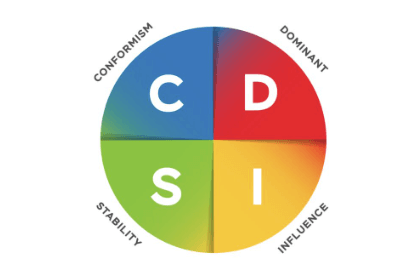When it comes to collaborative work environments, understanding communication styles, motivations, and behavior is essential for building effective teams and fostering positive workplace relationships.
The DiSC® training model offers a powerful framework for achieving this. DiSC®, which stands for Dominance, Influence, Steadiness, and Conscientiousness, is a personality assessment tool used to improve self-awareness, enhance communication, and strengthen team dynamics.
What Is the DiSC® Model?
DiSC® leadership training is based on four primary personality traits: Dominance, Influence, Steadiness, and Conscientiousness. Each trait reflects a different approach to communication, decision-making, and collaboration in a work setting.
Dominance (D)
People with a dominant style are assertive, results-oriented, and focused on achieving goals. They prefer to take control of situations and are motivated by challenges and competition.
Influence (I)
Those with an influential style are outgoing, enthusiastic, and relationship-focused. They excel in motivating and inspiring others and are driven by social interaction and recognition.
Steadiness (S)
Individuals with a steady style are cooperative, patient, and supportive. They value stability and harmony in the workplace and are motivated by collaboration and a sense of belonging.
Conscientiousness (C)
People with a conscientious style are analytical, detail-oriented, and systematic. They prioritize accuracy, quality, and logical decision-making, and are driven by a desire for knowledge and expertise.
Each individual falls into one or a combination of these categories, allowing for a nuanced understanding of their natural tendencies and how they interact with others.
See also: How to Grow Your Instagram Business: Strategies
How Does DiSC® Training Work?
DiSC® training typically begins with participants completing an assessment, which measures their tendencies and preferences across the four personality dimensions. The results provide a comprehensive profile, detailing the participant’s strengths, communication style, and areas for growth.
Once participants have their results, the following training sessions focus on applying these insights to improve workplace dynamics. This often involves workshops, role-playing exercises, and group discussions that explore how different DiSC® styles interact, how to resolve conflicts, and how to enhance collaboration based on personality differences.
Applications of the DiSC® Model in the Workplace
The versatility of the DiSC® model allows it to be used across various areas of business, from leadership development to conflict resolution. Here are some key applications:
Improving Communication
Effective communication is at the heart of any successful team, and the DiSC® model helps individuals better understand how they communicate and how to adjust their communication styles to fit different situations. For example, a leader with a Dominant style may learn how to adapt their direct, results-driven approach when communicating with a team member who has a Steady style and prefers a more supportive, patient approach.
Building Stronger Teams
Teams that understand each other’s DiSC® styles can work more cohesively by playing to each other’s strengths. For instance, a team that includes individuals from all four styles can leverage the assertiveness of Dominance, the enthusiasm of Influence, the dependability of Steadiness, and the analytical nature of Conscientiousness.
This self-awareness and appreciation for different working styles reduce conflict and foster a more collaborative environment where each team member can contribute their unique strengths to achieve shared goals.
Leadership Development
Leaders play a critical role in guiding their teams, and the DiSC® model can help individuals understand their natural style. Through exclusive training, leaders gain insight into how they direct and how they can adapt their approach to meet the needs of their teams.
For example, an individual with a Conscientious style may excel at strategic planning but may need to focus on being more approachable and engaging when leading a team that thrives on personal connection, such as those with an Influence style.
Conflict Resolution
DiSC® training is also highly effective in conflict resolution, as it helps individuals recognize and understand the different perspectives that may lead to disagreements. When employees are aware of their own and others’ styles, they can approach conflicts with greater empathy and find solutions that consider each person’s communication and working style.
The Modern Importance of DiSC® Leadeship Training
The DiSC® training model offers a practical and insightful approach to understanding behavior and improving workplace dynamics. Whether enhancing communication, building stronger teams, developing leadership skills, or resolving conflicts, DiSC® provides individuals with the tools to foster a more productive and harmonious work environment. By leveraging the power of self-awareness and understanding diverse personality traits, organizations can create teams that not only function more effectively but also thrive in the face of challenges.


